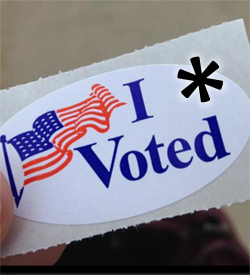Can you access the vote? Researcher says there’s still work to do
by Beth
 An article in the May 23, 2016 issue of Stanford Lawyer magazine quotes a Stanford researcher saying that the United States is ill prepared to accommodate people with disabilities at polling places in the upcoming presidential election.
An article in the May 23, 2016 issue of Stanford Lawyer magazine quotes a Stanford researcher saying that the United States is ill prepared to accommodate people with disabilities at polling places in the upcoming presidential election.
Researcher Rabia Belt will start her new position as an assistant professor teaching disability law and criminal law at Stanford this month and says rather than increasing access to voting, lawmakers seem to be doing just the opposite. From the article:
Strict voter ID laws popular in a growing number of states and aimed at cutting down on fraud at the polls are falling hardest on disabled voters, who are less likely to have the requisite documentation. Paradoxically, disabled citizens still wanting to cast ballots have to vote absentee, a process that studies have shown is especially subject to fraud and manipulation, Belt said.
I wrote a post here about phoning my State Board of Elections after poll workers couldn’t get the assistive technology at my polling place to work in a previous election. I spent a fair amount of time on hold back then before someone from the Illinois Board of Elections finally answered and listened to my story. “Were you able to vote in the end, then?” Yes, I said, but I wasn’t able to do it independently. I did my best to explain that the Help America Vote Act of 2002 mandates that voting systems provide some way for people to vote independently and privately, including those of us with disabilities. The Illinois Board of Elections assured me my poll workers would report the problem to the correct authorities and have it fixed. “You got assistance, then?” they asked. I told them yes, that my husband had signed an affidavit, that Mike had helped me in the voting booth. “So you were able to vote, then?” they asked. I said yes. “Okay, then, you’re all set,” they said, and hung up.
I called the voting section of the U.S. Department of Justice (Civil Rights Division) after that. The woman on the line asked me for details, took down notes and said someone would contact me. No one ever did.
The Help America Vote Act has been on the books for 14 years now. In this new Stanford Lawyer article, Belt says that in all this time, the Justice Department has not brought a single case under the law alleging violations pertaining to people with disabilities. “We could think of voting as so important that we make sure everyone is able to vote. But we also could say, ‘Voting is so important that we want to purify the electorate and make it hard for people to vote,’” Belt said. “I think there is a long history of the second phenomenon being true. We still see that today.”






